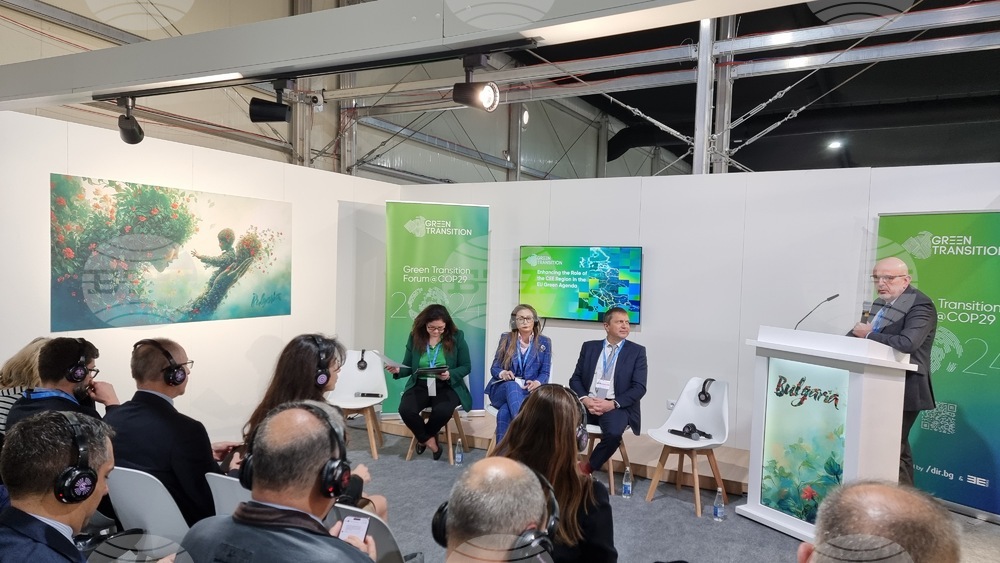site.btaJoint Work on Green Project in Central and Eastern Europe Dominated Discussion in Bulgarian Pavilion at COP29


Cooperation of Central and Eastern European countries was at the centre of the discussion on strengthening the role of the CEE region in the EU's green agenda, held at the Bulgarian pavilion of COP29 in Baku. The event was organized by the Green Transition Forum.
The Green Transition in the region was discussed by Alexandra-Maria Bocșe, State Counselor at the Department of Climate and Sustainable Development in the Administration of the President of Romania, Dr. Döne Yalçın, Managing Partner Turkey and Partner Austria of the law firm CMS, Dimitar Tsotsorkov, Chairman of the Supervisory Board of the Bulgarian company Asarel-Medet AD, Tsvetelina Kuzmanova, Senior Project Manager at the Cambridge Institute for Leadership in Sustainable Development, Barbara Kaufmann, Director at the Directorate General for Employment, Social Affairs and Inclusion at the European Commission, Julian Gikov, CEO at Raiffeisen Bank International AG, Vienna and Genady Kondarev, Senior Associate for CEE at E3G. The discussion panel was moderated by Ilia Lingorski, Chief Economist, Bulgarian Development Bank (BDB) and Chairman of the Energy, Infrastructure and Public-Private Partnership Committee of the European League for Economic Cooperation.
Alexandra-Maria Bocse spoke about the importance of cross-border projects in the green energy transition. She said that Romania plans to have 35% of the country's energy from renewable sources by 2030 and this will require cooperation with neighbouring countries to build infrastructure. Every contact between us brings us closer to jointly achieving climate goals, she said.
Tsvetelina Kuzmanova and Dr. Döne Yalçın stressed the importance of flexible regulation in the EU regarding the green transition. Stability and trust in governance and markets are key to success in the green transition, Kuzmanova said. Poland has historically been opposed to green policies, but is already attracting Japanese capital and other investment from around the world despite regulatory restrictions. The green transition is not just about additional costs and bureaucratic burdens, the benefits are already being seen, she said. Bulgaria ranked last in the latest edition of the Cambridge Institute for Sustainability Leadership's Competitive Sustainability Index, Kuzmanova added.
Turkiye is the region's renewable energy champion, Dr Yalçin said. She said regulations from 40-50 years ago are not appropriate for the current moment and should be updated.
Dimitar Tsotsorkov, who was honored by the UN as a pioneer of the Sustainable Development Goals, spoke about sustainability in business. "Sustainability means that you have a plan and you execute it in difficult conditions over a period of 30 years," he said, adding that it is easy to achieve the goals if work on them starts on time. Tsotsorkov said that Asarel-Medet invests half of its profits in its domestic business and will follow this strategy in the coming decades. "We are turning waste into copper. Copper is at the heart of the green transformation: without this raw material there will be no progress. Copper is in all the apparatus and infrastructure of green energy," he said. According to Tsotsorkov, there must be a balance in regulation.
The European institutions have prepared and adopted two legislative packages related to the Green Deal, laying the foundations for the new legislative framework, recalled Barbara Kauffmann of the European Commission. Your region is heavily affected by global warming and when we talk about a just transition, we need to find ways and strategies to create new jobs for people employed in certain sectors, she said.
Investors over the past dozen years have been taking a very close look at regulations in Central and Eastern Europe's green economy, said Julian Gikov of Raiffeisenbank. Predictability is key for green projects seeking investors, he said.
Often, even countries that are cautious in their commitments become champions and their results exceed their green transition commitments, said Genady Kondarev of E3G. Five years ago, no one believed that by 2030 Europe would be about to abandon coal. The most difficult thing is to change people's mentality, but there are a lot of opportunities, he added.
/NF/
news.modal.header
news.modal.text